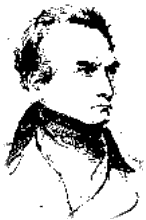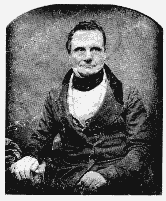|
|
|
Home > Charles Babbage
In July of 1822, two days after Shelley drowned, Babbage described to the president of the Royal Society his plan for calculating and printing mathematical tables by machine. Inventor of the first universal digital computing device, the logical structure of the modern computer can be traced back to Babbage. When he died in 1871, however, few people knew who he was - except out of notoriety.
 |
Born 1791 in Devonshire, the son of a Tory banker, he graduated in 1827 from Trinity College, Cambridge. Two years later he had published a table of logarithms from 1 to 108000. In 1829 he produced the Difference Engine, a special purpose device intended for the production of tables. But it was his work on the Analytical Machine from 1834 to his death that earned him the title "The Father of Computing". The Whiggery of the mid-Victorian era optimistically endorsed the principle of progress, and Babbage saw the route to advancement in man's mastery over nature. Babbage wanted to quantify everything. A firm Newtonian, fact and data intoxicated him. He founded both the British Association's Statistical Society and the Royal Astronomical Society.
His calculating and rationalistic character was the driving force behind On the Economy of Manufactures (1832). With watch in hand, Babbage discovers operational research, the scientific study of manufacturing processes. It is a tour of the manufacturing processes of the period, from needle-making to tanning. The man was among the first to apply higher mathematics to commercial and industrial problems. In Mechanics Magazine in 1857 Babbage published a "Table of the Relative Frequency of the Causes of Breaking of Plate Glass Windows". Babbage thought the table would be "of value in many respects", and might "induce others to furnish more extensive collections of similar and related facts". He once was lowered into Mt. Vesuvius to view molten lava.
|
|
In later life, he became eccentric and harsh in his opinions. Babbage's Observations of Street Nuisances (1864) saw him calculate that noise-making and street musicians had destroyed 25% of his working power. Letters to the Times and the enforcement of "Babbage's Act", which would squelch street nuisances, made him the target of ridicule. Children followed and cursed him in the streets. Over a hundred people once skulked behind him before he could find a constable to disperse them. Babbage's inadequacy as a political man was probably the main cause for his Analytical Engine being forgotten about for so long. He never understood that the industrial expansion he championed also caused the growth and crowdedness of cities such as London. Pro-aristocratic and strongly antisocialist, in his later years he came to regard men as fools. By 1861 he said he had never spent a happy day in his life, and would gladly give up the rest of it if he could live three days 500 years thence. It is easy to forget that Babbage was essentially a child of the Enlightenment, and that his epoch was much different from our own. He resided in an era of wood and coal, yet his intense curiosity about all things laid the foundations of the computer on which you view this web page. |
 |
|
Useful Links Search for Charles Babbage on: Please email any comments or feedback you have for this site |